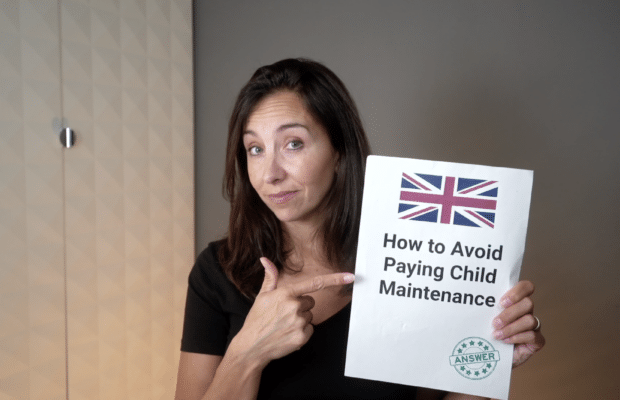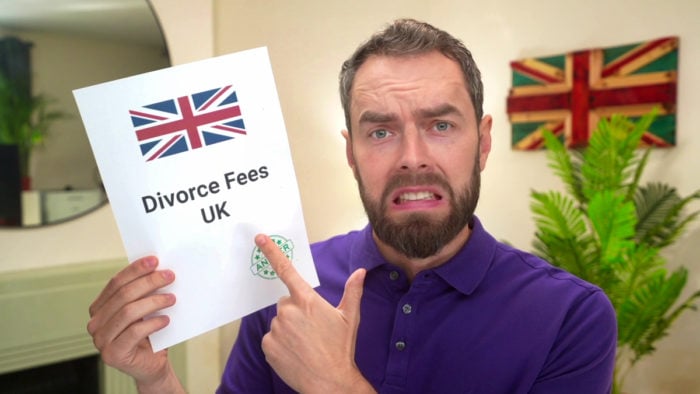How to Avoid Paying Child Maintenance (2024 Loopholes)

Understanding child maintenance in the UK can feel like a puzzle. Don’t worry; this guide is here to help. Each month, over 8,700 people visit our website for help with divorce issues.
In this simple guide, we’ll explain:
- How to work out child maintenance
- How child benefits are different from child support
- Ways to make sure your divorce is fair
After a divorce, people spend around 4.7 years renting, costing up to £40,890 outside London and £71,966 in London.1 This highlights the need for informed decisions on child maintenance and finances during this time.
Our expert team knows these topics well. We’re here to help you find the best way to manage child maintenance in a good way.
How to save money on divorce fees
How to save money on divorce fees
Divorces are hard to handle, but the financial repercussions can make a bad situation feel even worse.
The solution? Understanding your next steps and exactly how much they’ll cost.
For only £5, JustAnswer offers a trial chat with an experienced divorce solicitor. They can help you navigate the process and save you from costly face-to-face lawyer fees.
Chat below to get started with JustAnswer
In partnership with Just Answer.
Tricks for Avoiding Paying Child Support
It’s important to note that the law says both parents are responsible for taking care of their children financially, whether they live with them or not.
So, avoiding child support could have serious legal consequences.
There are ways, however, to manage your child’s maintenance payments responsibly and legally. Some are listed below.
- There are two types of child maintenance arrangements supported by the Child Maintenance Service. In the first case, both parents agree privately, allowing for flexibility and adaptability. This can be the cheaper option if you are trying to minimise your child’s maintenance payments.
- If you’re having trouble making payments, make sure CMS has the right information. A job loss, salary reduction, or other changes in income can affect the amount of child maintenance you have to pay. Keeping the CMS updated about your finances can lead to adjustments.
- UK law says you don’t have to pay child maintenance if you’re a full-time student, in prison, or don’t have an income. Also, child support obligations typically end when the child turns 16 or 20 if they’re still in full-time education.
- If you’re paying too much and your finances warrant a reduction, you can apply for a variation. It’s a formal request for CMS to consider reducing your payments because of unmanageable debt, high living costs, or other special circumstances.
Don’t forget that these suggestions are meant to help you manage your responsibilities, not avoid them.
The purpose of child maintenance is to make sure the child is happy and healthy. Avoiding these payments can lead to legal action, fines, or prison time in extreme cases.
Not only that, by trying to avoid payment child support then you are not putting your child(ren) first and they could suffer because of your actions.
The way I see it, it’s important to consider the impact on your children’s mental and emotional well-being if you’re trying to avoid paying child support.
If necessary, get legal advice and communicate openly with your ex-partner and CMS to resolve problems.
Is Your Divorce Contested or Uncontested?
A divorce can be contested or uncontested in the UK, and each has different consequences.
A divorce that’s uncontested means both parties agree to the terms, so it’s faster and less expensive. In a contested divorce, one party doesn’t agree to the terms of the divorce, which can make it longer, more expensive, and more complicated.
Child maintenance principles remain the same regardless of whether a divorce is contested or uncontested.
According to Child Maintenance Service guidelines, both parents are responsible for raising the children, even if they don’t live with them.
When there’s a contested divorce, figuring out child maintenance might be harder.
The Child Maintenance Service can calculate the amount based on certain criteria, such as income and number of children, if parents cannot agree.
If parents can’t work out an arrangement, the court can make child support orders.
In an uncontested divorce, parents might be able to reach a mutual agreement about child support, saving the Child Maintenance Service and court time.
The UK’s new no-fault divorce laws were introduced in April 2022 to reduce conflict among divorcing couples, which may have a positive impact on child maintenance decisions.
Although a contested or uncontested divorce may change the ease or difficulty of deciding on child maintenance arrangements, neither type of divorce changes the principles or legal obligations of parents.
The well-being of the child is paramount, and both parents must contribute financially to the child’s upbringing.
Divorce Costs
Child support plays a crucial role in divorce, but it’s just one aspect of the financial picture. Keep in mind that divorce involves various expenses.
For a full overview, check out the table below.
| Category | Costs |
|---|---|
| Court Fees |
Filing for Divorce: £593 standard fee. Additional Applications: Financial orders or child custody arrangements. |
| Legal Representation Fees |
Fixed-Fee Options: For straightforward, uncontested divorces, with fees ranging from £500 to £1500 excluding VAT. Hourly Rate: Solicitor fees range from £150 to £400 depending on their experience and location. |
| Barrister Fees | For cases that go to court or require specialised legal advice. The cost of this will be completely dependent on your case and preferences. |
| Financial Advisor or Accountant Fees | For cases involving complex financial matters. The cost of this will be completely dependent on your case and preferences. |
| Valuation Fees | You may need to pay for property, business, or pension valuations as part of the financial settlement. The cost of this will be completely dependent on your case and preferences. |
| Out-of-Court Options |
Mediation: Some mediators charge per session (ranging from £50 to £200 per hour), while others may offer a package deal. Collaborative Law: Both parties hire solicitors, but agree to resolve issues without going to court. The cost of solicitors will vary depending on your preferences and case. Arbitration: Rates vary depending on case complexity, room hire, and arbitrator fees. |
| Indirect Costs | Time off work to attend court hearings or meetings with solicitors. Child maintenance costs. |
Worried About Divorce Finances?
Divorce can be complicated, especially when it comes to navigating the cost. One small error could lead to serious consequences.
But, the support of a good solicitor can help you to understand your next steps.
For a £5 trial, JustAnswer’s online divorce solicitors can help you understand your rights and guide you towards the best financial solution for you.
Try it below.
In partnership with Just Answer.
If Contested, Did the Court Make a Financial Order That Included Child Support?
When you and your ex-partner can’t agree on how to split your money, you can ask the court for a financial order, also known as an ancillary relief order.
This would also be appropriate if you believe your ex-partner is trying to protect money by hiding it before the divorce. Various assets like pensions, property, savings, and investments can be divided in this order.
A financial order can also include child support arrangements.
While child maintenance can be included in a financial order if it is part of a consent order, it would only be legally binding for 12 months; for a longer-term solution, a financial order would be required.
When a consent order expires, the Child Maintenance Service takes over jurisdiction to enforce child maintenance, including calculating it.
The CMS calculates how much of the payer’s income should go to the children’s primary caregiver. Even if they don’t live together, both parents have to contribute to raising their children.
Therefore, child maintenance can be included in a financial order for a contested divorce.
However, the CMS will have to get involved at some stage unless the court issues a financial order to enforce the divorce settlement.
» TAKE ACTION NOW: Get legal support from JustAnswer
If Uncontested, Did You Reach an Agreement With Your Partner Over Child Support?
If you are going through an uncontested divorce where both parties agree to its terms, working out child maintenance responsibilities will be pretty straightforward.
There are three options at your disposal, as listed below.
- The two of you decide how much each parent pays to the other. Child maintenance can be arranged however the parents want. This approach allows parents to be flexible and come up with a solution that fits their needs and circumstances. You have to remember, though, that these arrangements aren’t legal.
- The Child Maintenance Service can calculate the amount if you can’t agree on a family-based arrangement. Various factors will be considered, like income, children, and shared responsibilities. CMS offers a statutory child maintenance scheme that’s different from Child Support Agency schemes.
- When parents can’t agree on child maintenance or if there are other complications, a court order is your best option. A parent with responsibilities to a child and living abroad or having a high level of wealth could fall into this problematic category. A fair arrangement will be made based on the child’s best interests.
Join thousands of others who got legal help for a £5 trial
Getting the support of a Solicitor can take a huge weight off your mind.
Reviews shown are for JustAnswer.
What if Your Ex-Partner Is Avoiding Paying Child Maintenance?
A lapse in receiving child maintenance can be stressful and put a strain on your finances and therefore potentially affect your ability to provide for your child(ren).
There are a few things you can do if your ex-partner in the UK won’t pay child support.
Some of these are listed below, but which is right for you will depend on your own situation.
- The Child Maintenance Service is a good place to start. If you have a private arrangement and the other parent isn’t paying, you should try talking to them and figure out why. You’ll have to approach the CMS if that’s not possible. Let them know the private arrangement failed because the other parent didn’t pay.
- There are a few ways the CMS enforces payments. The CMS can take the owed amount directly from the paying parent’s earnings or their bank, building society, or post office account if they don’t pay.
- In addition, if these methods don’t work, the CMS can get a court order. In a liability order, a parent admits they haven’t paid child support over a specific period. The CMS can then ask the parent to pay the debt once the order is in place.
- If the CMS service isn’t able to collect the arrears and other methods haven’t worked, you can take further enforcement action. There are various options here, and it is advisable to seek legal advice to find out the best option for you.
It’s important to notify the CMS if you make or receive any extra payments or if you’re having payment problems.
Dealing with child maintenance that is in contention can be challenging, but remember that both parents are legally responsible for raising their children, even if they don’t live together.
Divorce Doesn’t Mean Financial Ruin
Legal advice can make all the difference when navigating the financial aspects of divorce, and affordable help is within reach.
Normally, the cheapest solicitors in the UK will put you back at least £130 per hour.
But, for a £5 trial, a divorce solicitor from JustAnswer can review your situation and provide personalised guidance. It’s a no-brainer!
Try it below.
In partnership with Just Answer.



